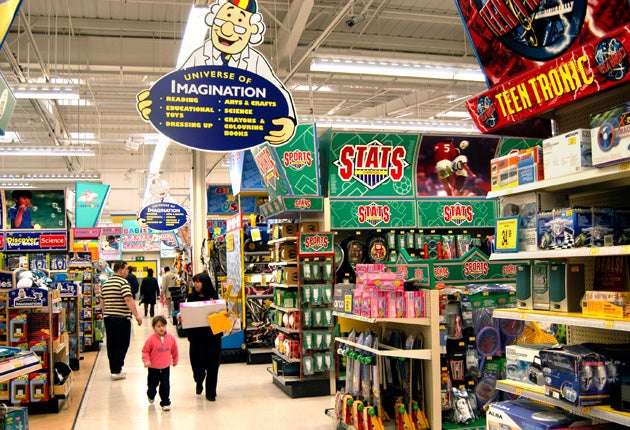Spelman plans to get tough on toy packaging and recycling

The toy industry faces a crackdown on excessive packaging under plans to reduce the amount of rubbish sent to landfills, the new Environment Secretary has warned.
Parents who complain that new toys are wrapped in too much plastic and cardboard may have found an ally in Caroline Spelman, who announced the move during her first interview in her new role.
She plans to extend the voluntary Courtauld Commitment on grocery packaging to toys and other sectors of the leisure and entertainment industries. Mrs Spelman will today announce a review of waste disposal, with the aim of raising the level of household rubbish put out for recycling in the UK, which at 18 per cent is one of the lowest in Europe.
Expressing her irritation at the amount of packaging that forms much of household waste, the Cabinet minister, who has three children, told The Independent: "I'm a working mum who has to cook supper and it frustrates me that so much of what I purchase to feed the family is double- or treble-wrapped, quite often in tough plastic, and you do slice your finger trying to get into it.
"While we don't want damaged goods or anything which will compromise the safety of food, I do question how much packaging is necessary and how much is marketing," she said.
Mrs Spelman accused toy companies in particular of artificially inflating the appeal of their products by placing them in excessively large boxes. "My teenage children are constantly bringing items home in thick packaging, polystyrene and cardboard, and it's really all about making the product attractive to buy rather than packaging it safely," she said.
"If you go into an average toy shop and look how children's toys are packaged, that's very much about marketing – attractive boxes, large boxes, filled with usually fairly large quantities of packing materials before you get to the goodies at the heart of it."
Although the review will examine whether other forms of disposal, such as incineration and anaerobic digestion, should be increased to reduce landfill, Mrs Spelman – a surprise choice to take over at the Department of Environment, Food and Rural Affairs (Defra) after shadowing the Communities Department – said she hoped to "incentivise" people to recycle rather than "hector or bully them".
Under the Courtauld Commitment, which was agreed five years ago, supermarkets including Tesco and Sainsbury agreed to start reducing the amount of packaging on own-label products by 2008. Further cuts are to be made by 2012 under the second stage of the agreement, but it does not cover many sectors of general retailing, such as toys.
"I think what we would really like to see in our review is an extension of the Courtauld Commitment which looks at retail packaging," Mrs Spelman said. "As a working mum, when I look at the refuse and what is being discarded, there is almost nothing that needs to go to landfill. So if you analyse what we are casting away, most of it can be recycled one way or another."
She said the Government would consider tightening the law against excessive packaging, which trading standards officers claim is riddled with loopholes. The Independent has run a long campaign against excessive packaging, showing how it wastes raw materials and clogs up landfill sites.
Cutting packaging
Voluntary agreement
Under the 2005 Courtauld Commitment, named after the gallery where it was signed, food retailers and manufacturers agreed to "design out" packaging growth by 2008. Under a second phase of the voluntary agreement in March, to be achieved by 2012, 29 firms including Heinz, Danone and Warburtons agreed to a series of new targets, such as reducing the carbon impact of grocery packaging by 10 per cent, household food and drink waste by 4 per cent and supply chain packaging by 5 per cent. But the agreement does not cover other areas such as toys or technology.
Legal loopholes
There is a law against excessive packaging but trading standards say the Packaging (Essential Requirements) Regulations are unenforceable. The law says packaging should be restricted to "the minimum to maintain necessary levels of safety, hygiene and acceptance" but includes a clause allowing extra packaging where it has "consumer acceptance", where needed to "provide identification" or for "stimulating purchase".
Subscribe to Independent Premium to bookmark this article
Want to bookmark your favourite articles and stories to read or reference later? Start your Independent Premium subscription today.

Join our commenting forum
Join thought-provoking conversations, follow other Independent readers and see their replies